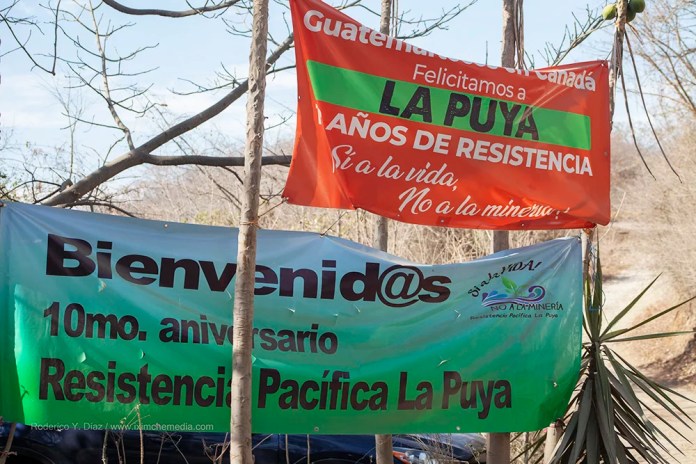KCA, a Reno Nevada based mining company, suspended gold mine in Guatemala

Sierra Nevada Ally | 26 July 2022
KCA, a Reno Nevada based mining company, suspended gold mine in Guatemala
By Jennifer Moore, Associate Fellow with the Institute for Policy Studies Global Economy Program, and Ellen Moore, International Mining Campaign Manager with Earthworks
When Nevada-based Kappes, Cassiday & Associates (KCA) filed an international arbitration suit against the Guatemala government over a disputed gold mine, it looked like the $400 million dollar threat might pressure the government to restart its project. The government response, however, was surprising. The same Guatemalan government that has been more than happy to force unwanted mining projects on a population ready and willing to defend their water and territory, adopted the community’s message: KCA’s mine is illegal, illegitimate, and should never have operated at all.
To defend itself against the arbitration brought by KCA under the terms of the Dominican Republic-Central America Free Trade Agreement (DR-CAFTA), the Guatemalan government turned to local communities organized as the Peaceful Resistance La Puya for information. The government defense draws heavily on the movements’ evidence and experience fighting to protect their water and health from KCA’s mine which would have dire impacts; given water scarcity in the area known as the “dry corridor” and how mining activities would aggravate the already considerable presence of arsenic in the area.
KCA filed the suit in 2018 after a court decision in late 2015 led to the suspension of its gold mine for lack of prior consultation with the affected communities. The company argues that it has been treated unfairly and that the government did not do enough to repress La Puya.
In its response, the Guatemalan government argues, as La Puya has for the last decade, that KCA’s Environmental Impact Assessment was so incomplete and deficient that “it should not have been approved;” that the company violated around 50% of its environmental obligations, and that it lacked the necessary municipal construction license operating illegally from the start.
Despite the court ruling to suspend the mine, community members living near KCA’s gold mine just north of Guatemala City continue, as they have for the last ten years, to maintain a round-the-clock protest camp in front of the laneway to the mine site. Given their government’s propensity to ignore its own laws and court rulings, the permanent protest is a demonstration of the social opposition and pressure to keep the mine closed.
Things have been quieter at La Puya since the mine was suspended. However, locals feel latent tension that the imminent consultation process or the arbitration suit could revive earlier threats, violence, and legal persecution from company employees and contractors. In May 2014, the Guatemalan government deployed police on various occasions to help KCA finally admit its machinery onto the mine property.
More recently in late 2021, the Guatemalan government sent the military into another part of the country, giving troops special powers and suspending basic constitutional guarantees during a consultation process over a nickel mine. Communities critical of the mine were not allowed to participate in the consultation and, unsurprisingly, the mine was allowed to continue operating. People at La Puya fear that something similar could happen to them once the consultation gets underway.
Stalwart participants at La Puya recently shared these concerns during the visit of a delegation of U.S. Congressional members in late March as part of a fact-finding mission to Central America. Representatives Ilhan Omar (D-MN), Cori Bush (D-MO), and Jamaal Bowman (D-NY), along with representation from the offices of Jan Schakowsky (D-IL) and Jesús “Chuy” García (D-IL), visited La Puya as part of a weeklong trip to Honduras and Guatemala.
As twelve (12) members of Congress outlined in the following letter sent this week to Secretary of State, Antony J. Blinken, “The government’s brief includes how the company’s investment in the mine increased after the community set up its permanent resistance camp, and how the company, coordinating with national police, used aggression and threats in its successive attempts to dismantle community resistance.”
Despite relying on community arguments to prove KCA’s gold mine is illegal and illegitimate, the government’s show of support for the resistance is no guarantee that it will not repress its own people again to try to restart mining activities. Such is the perversity of an arbitration system put in place through thousands of International Investment Agreements that give companies recourse to sue governments over decisions they do not like. This is also how a company like KCA, which never respected the law or the Guatemalan people, is able to sue the country for future lost profits of an unwanted project. Win or lose, the result holds no assurance for the people whose lives and livelihoods are most impacted by the mine.
The Guatemalan government should act on the evidence of the illegality and illegitimacy of KCA’s gold mine to cancel the project once and for all. Given the considerable uncertainty that this will happen, it is important that members of Congress are calling on the State Department to ensure that the U.S. Embassy in Guatemala is vigilant, “speaks out against any case of aggression or repression against land defenders,” and “that [it] refrains[s] from providing support to the company should it be requested.”





